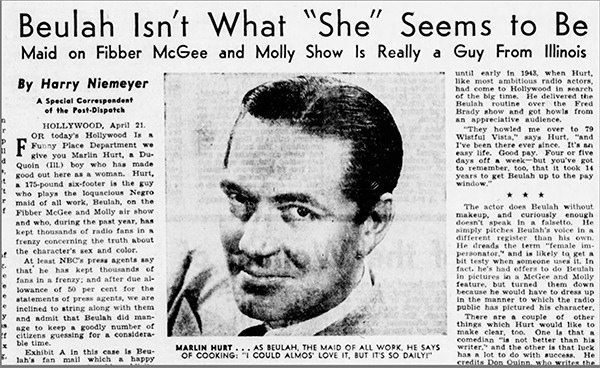Jim Crow Museum
1010 Campus Drive
Big Rapids, MI 49307
[email protected]
(231) 591-5873
Hey, I just found out that Beulah was a white man. I mean the black woman on the radio way back.
--Annese Pugh
New Orleans

As with you, I was surprised to learn that the original radio Beulah was played by Marlin Hurt, a white male actor. Hurt first played the role of Beulah on the Hometown Incorporated radio series in 1939, and in the 1940 radio series Show Boat. In 1943, Hurt’s Beulah was on the radio series That’s Life and became a main supporting character on the Fibber McGee and Molly show in 1944 (Cortes, 2015, p. 337).
The character Beulah was a hired maid for the McGee family. She worked one day a week, Tuesdays, to “cook, clean, wash and respond to Fibber’s wise cracks” (Female African American, n.d.). Beulah was an instant hit and received many laughs with her catchphrases “Somebody bawl fo’ Beulah?” and “Love that man!” Studio audiences at the live recordings of the Fibber McGee and Molly show provided the laughter. They were, no doubt, surprised to see a white actor playing the role of Beulah.
The success of Beulah led to a spin off show in 1945 called The Marlin Hurt and Beulah Show. The character Beulah was the cook and housekeeper for the Henderson family. Hurt envisioned Beulah as an African American woman “in her 30’s, is man-crazy, weighs about 140 pounds…adores short skirts and extremely high heels” (Dunning, 1998, page 84). Hurt based the Beulah character on an African American woman named Mary who cooked for his family when he was a child. Hurt would try to mimic Mary’s voice and was known as a “master of what was perceived by the radio audience to be black dialect” (Dunning, 1998, pg. 83). Some newspapers reported that Hurt received fan mail and much praise from African Americans who deemed Hurt’s Beulah “one of the few authentic colored dialects on the air today” (St Louis Post-Dispatch, 1945, April 22).
Hurt played the roles of Beulah, Bill, (the love interest of Beulah), and himself, Marlin, on The Marlin Hurt and Beulah Show until his sudden death in 1946. Bob Corley, another white actor, replaced Hurt in 1947, and the show was renamed The Beulah Show (Fibber McGee and Molly, n.d.).
The character of Beulah was considered a “novelty character” as it was created and portrayed by white male actors until CBS changed the character and cast Hattie McDaniel, a famous African American actress, in the title role in 1947 (Dunning, 1998, pg 84). McDaniel played the role for four years until she became ill. Lillian Randolph took over the lead role in 1952 and her sister Amanda Randolph replaced her for the 1952-1953 radio season (Beulah Debuts on TV, n.d.).
The Beulah radio show was modified for television in 1950 and ran for three seasons until 1953 with Ethel Waters, Hattie McDaniel, and Louise Beavers all performing the title role at various times (Beulah Debuts on TV, n.d.).
The character of Beulah entered American homes for nearly 14 years, either via radio or on television, from 1939 until 1953. Beulah depicted a common stereotype of a Mammy domestic whose life and situations revolved around her service to white households and her comedic relief to white Americans. When Hattie McDaniels was playing Beulah, the NAACP lauded The Beulah Show as groundbreaking because McDaniel was paid $1,000 a week to play Beulah and was the first African American to have a lead role on a radio program (Fibber McGee and Molly, n.d.). Even though small wins and African American first are still important and notable, the fact that Beulah, like many stereotypes and caricatures, was created by and initially portrayed from the perspective of white American males cannot be overlooked.
Franklin Hughes
Jim Crow Museum
May 2016
Cortes, C. (2013) Multicultural America, A Multimedia Encyclopedia. Sage Publications, Los Angeles, California, 2013, pg. 337.
Dunning, J., (1998). On the Air: The Encyclopedia of Old-Time Radio. Oxford University Press, New York, 1998, pp 83-84.